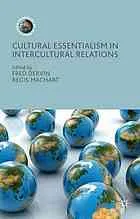Cultural essentialism in intercultural relations
4.5
Reviews from our users

You Can Ask your questions from this book's AI after Login
Each download or ask from book AI costs 2 points. To earn more free points, please visit the Points Guide Page and complete some valuable actions.Cultural Essentialism in Intercultural Relations: An Introduction
The book Cultural Essentialism in Intercultural Relations by Fred Dervin and Regis Machart critically examines the concept of cultural essentialism, a dominant yet controversial framework in intercultural studies and communication. By challenging deeply entrenched stereotypes and generalizations about cultures, the authors offer a refreshing perspective on intercultural encounters grounded in complexity, fluid identities, and dynamic human relationships. Through rigorous analysis and concrete examples, this text dismantles the oversimplified notion of fixed cultural characteristics and promotes a much-needed alternative framework for understanding diversity in today's globalized world.
Detailed Summary of the Book
Cultural Essentialism in Intercultural Relations begins by addressing the widespread dominance of cultural essentialism, which refers to the tendency to define individuals and groups through rigid, predetermined cultural attributes. Dervin and Machart argue that this way of thinking perpetuates stereotypes, reduces intercultural interactions to superficial exchanges, and ultimately reinforces inequalities and misunderstandings. Using a multidisciplinary approach, the authors weave insights from sociology, education, critical theory, and anthropology to question the validity and authenticity of essentialist assumptions.
The book unfolds in several interconnected sections, each focusing on specific aspects of cultural essentialism and its implications. For instance, early chapters analyze how essentialist thinking has influenced education, particularly in foreign language teaching, where practices often emphasize fixed cultural norms rather than fostering critical awareness. The authors then delve into the media and political discourses that perpetuate essentialist views, highlighting how biased narratives and policies normalize exclusionary practices under the guise of cultural difference.
Perhaps the most compelling part of the book is its proposal for alternative frameworks to replace cultural essentialism. Borrowing from concepts such as cultural hybridity, dialogism, and postmodern approaches to identity, Dervin and Machart advocate for an understanding of culture that appreciates its dynamism. They argue for an intercultural paradigm that values openness, reflexivity, mutual respect, and a critical awareness of power dynamics. Unlike traditional approaches, this model emphasizes co-creation and transformative interactions.
As the book progresses, readers are introduced to practical examples that illustrate the harm of essentialist thinking and the benefits of embracing complexity. Through diverse case studies, the text brings theoretical ideas to life, showing how they can be applied in real-world contexts, from workplaces to classrooms and cross-cultural collaborations.
Key Takeaways
- The dangers of cultural stereotypes and oversimplified assumptions in intercultural relations.
- The importance of moving beyond fixed cultural categories to understand identity as dynamic and context-dependent.
- How essentialist thinking perpetuates social inequalities and hinders genuine intercultural collaboration.
- A call to adopt reflexive, critical, and dialogic approaches when engaging with cultural diversity.
- Practical strategies for educators and professionals to challenge cultural essentialism in their respective fields.
Famous Quotes from the Book
"Culture is not a container or a passport; it is a negotiation, an ongoing process that binds and divides simultaneously."
"Stereotyping cultures is like trying to freeze a river – its natural flow and fluidity are what define its essence."
"To truly embrace interculturalism, we must first unlearn the false certainties of essentialism."
"An intercultural encounter is not about ‘us vs. them,’ but about the dynamic ‘we’ that emerges when individuals connect and collaborate."
Why This Book Matters
In a time when intercultural interactions are becoming increasingly frequent due to globalization, migration, and technological advancements, Cultural Essentialism in Intercultural Relations is a timely and essential read. The book addresses one of the most pressing challenges of our era: the need to foster meaningful connections and understanding across cultural boundaries while rejecting harmful stereotypes and reductive ideas. It offers an invaluable resource for educators, policymakers, researchers, and anyone interested in building a more inclusive world.
What sets this book apart is its ability to blend theoretical thought with practical application in a way that is accessible without compromising on scholarly depth. By advocating for a more nuanced and critical approach to intercultural relations, Dervin and Machart pave the way for readers to rethink their perspectives and actively contribute to more equitable and respectful intercultural practices. This book does not just critique; it inspires, challenges, and empowers.
Free Direct Download
Get Free Access to Download this and other Thousands of Books (Join Now)
For read this book you need PDF Reader Software like Foxit Reader


